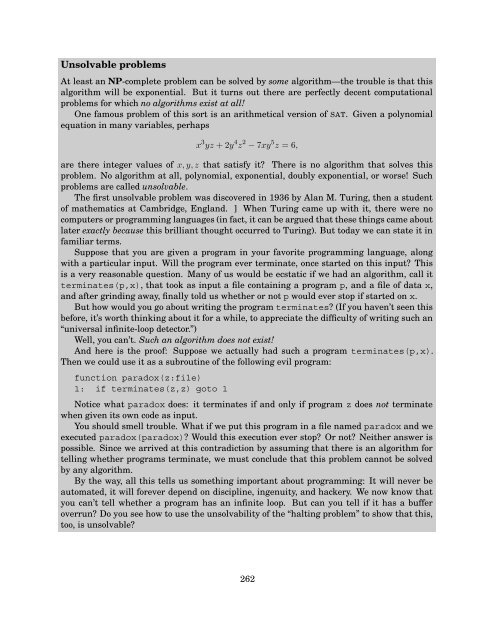Create successful ePaper yourself
Turn your PDF publications into a flip-book with our unique Google optimized e-Paper software.
Unsolvable problems<br />
At least an NP-complete problem can be solved by some algorithm—the trouble is that this<br />
algorithm will be exponential. But it turns out there are perfectly decent computational<br />
problems for which no <strong>algorithms</strong> exist at all!<br />
One famous problem of this sort is an arithmetical version of SAT. Given a polynomial<br />
equation in many variables, perhaps<br />
x 3 yz + 2y 4 z 2 − 7xy 5 z = 6,<br />
are there integer values of x, y, z that satisfy it? There is no algorithm that solves this<br />
problem. No algorithm at all, polynomial, exponential, doubly exponential, or worse! Such<br />
problems are called unsolvable.<br />
The first unsolvable problem was discovered in 1936 by Alan M. Turing, then a student<br />
of mathematics at Cambridge, England. ] When Turing came up with it, there were no<br />
computers or programming languages (in fact, it can be argued that these things came about<br />
later exactly because this brilliant thought occurred to Turing). But today we can state it in<br />
familiar terms.<br />
Suppose that you are given a program in your favorite programming language, along<br />
with a particular input. Will the program ever terminate, once started on this input? This<br />
is a very reasonable question. Many of us would be ecstatic if we had an algorithm, call it<br />
terminates(p,x), that took as input a file containing a program p, and a file of data x,<br />
and after grinding away, finally told us whether or not p would ever stop if started on x.<br />
But how would you go about writing the program terminates? (If you haven’t seen this<br />
before, it’s worth thinking about it for a while, to appreciate the difficulty of writing such an<br />
“universal infinite-loop detector.”)<br />
Well, you can’t. Such an algorithm does not exist!<br />
And here is the proof: Suppose we actually had such a program terminates(p,x).<br />
Then we could use it as a subroutine of the following evil program:<br />
function paradox(z:file)<br />
1: if terminates(z,z) goto 1<br />
Notice what paradox does: it terminates if and only if program z does not terminate<br />
when given its own code as input.<br />
You should smell trouble. What if we put this program in a file named paradox and we<br />
executed paradox(paradox)? Would this execution ever stop? Or not? Neither answer is<br />
possible. Since we arrived at this contradiction by assuming that there is an algorithm for<br />
telling whether programs terminate, we must conclude that this problem cannot be solved<br />
by any algorithm.<br />
By the way, all this tells us something important about programming: It will never be<br />
automated, it will forever depend on discipline, ingenuity, and hackery. We now know that<br />
you can’t tell whether a program has an infinite loop. But can you tell if it has a buffer<br />
overrun? Do you see how to use the unsolvability of the “halting problem” to show that this,<br />
too, is unsolvable?<br />
262


